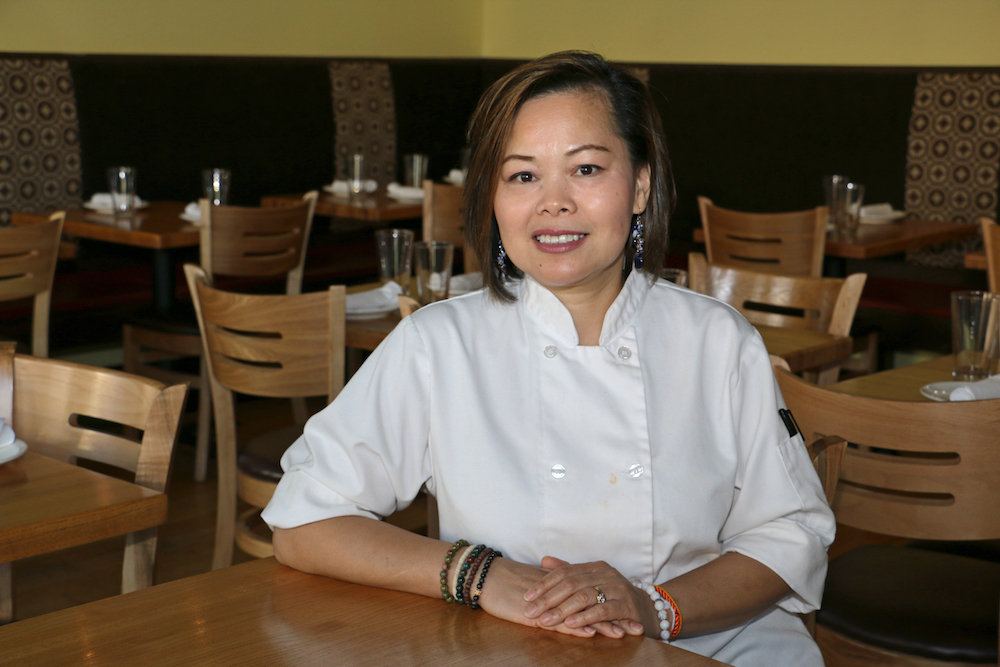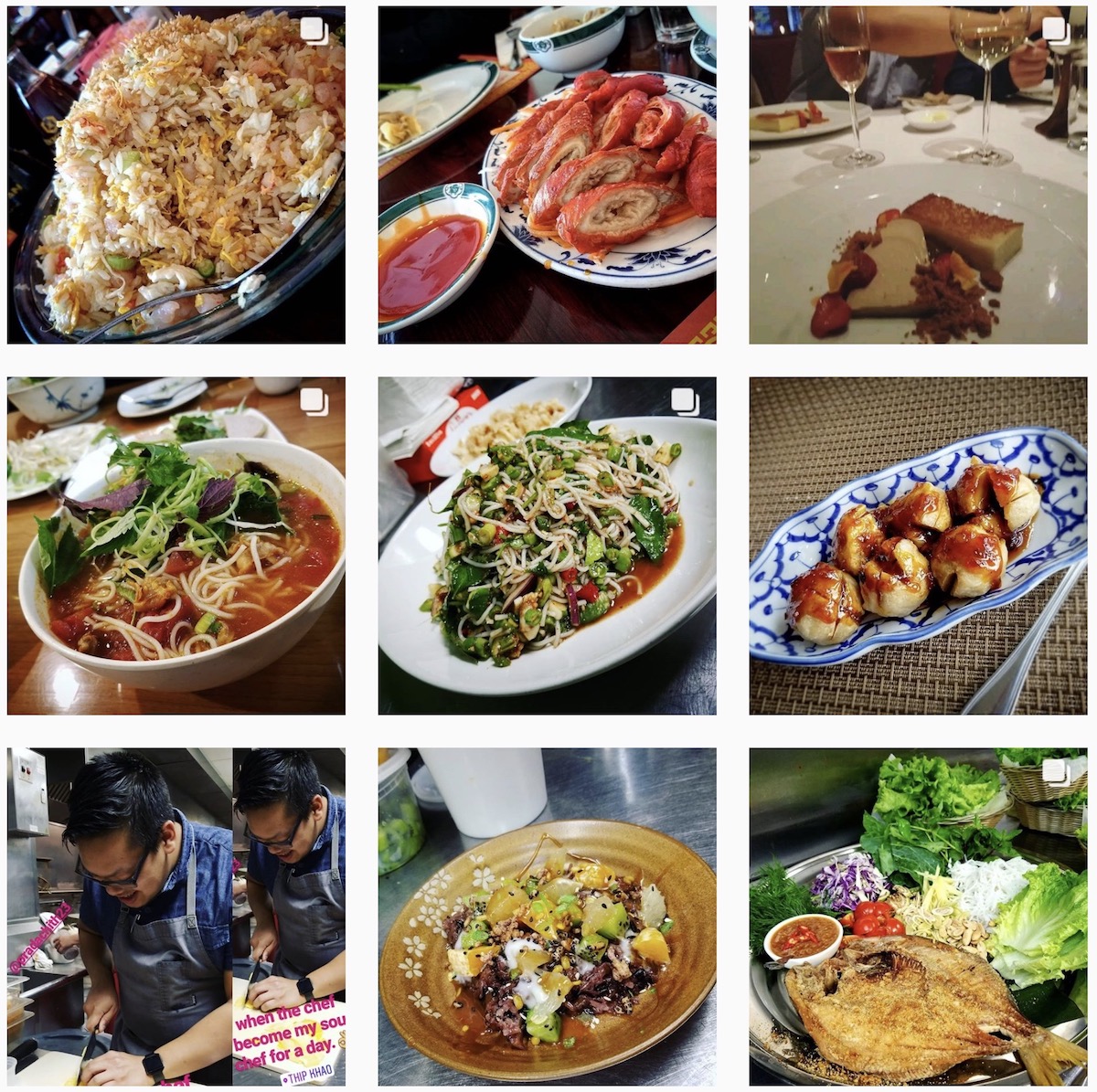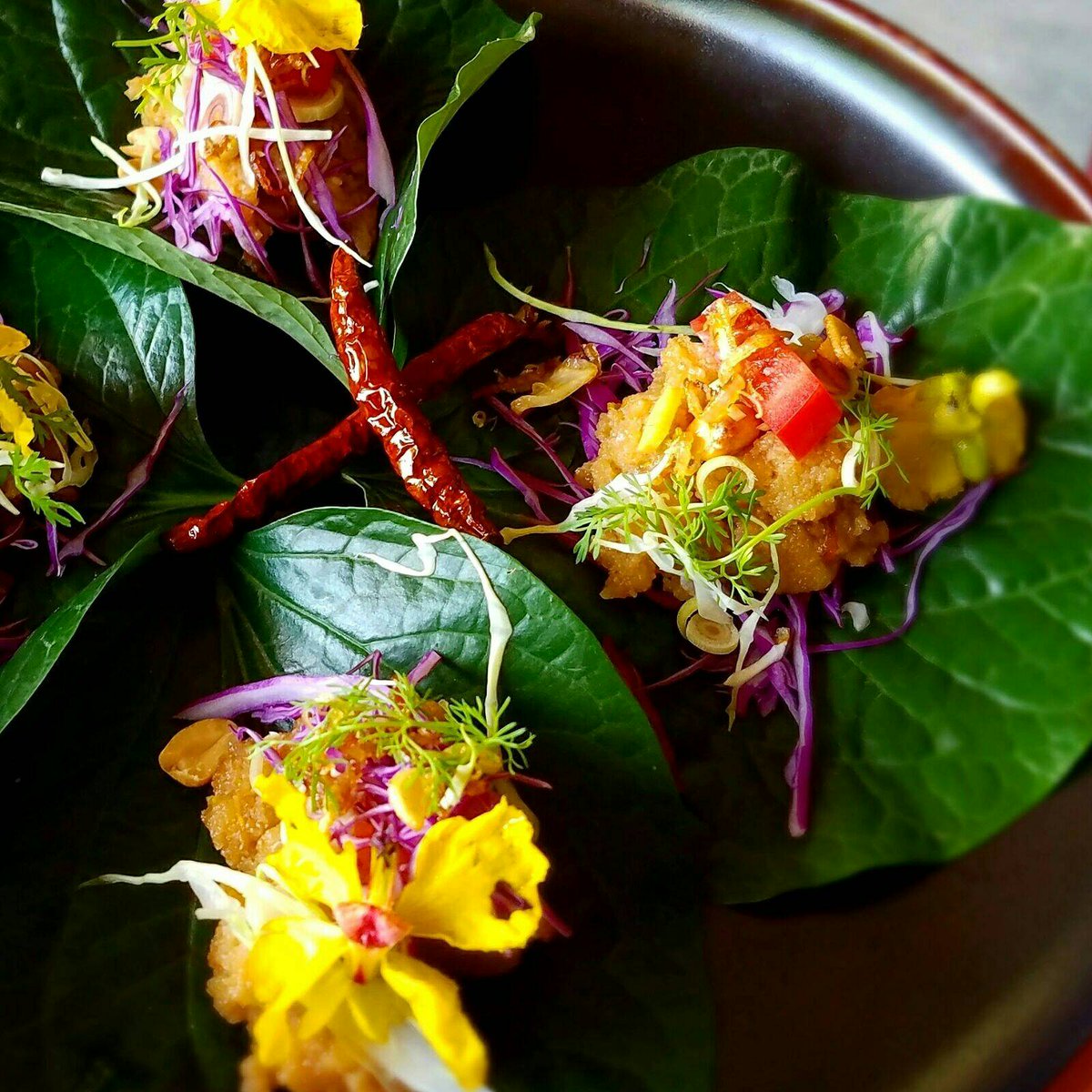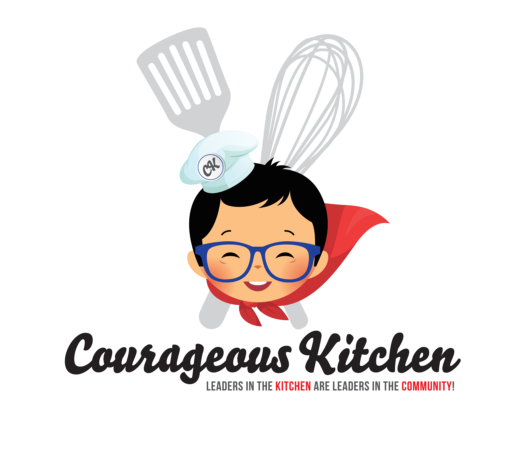We recently invited our fans and supporters to send in questions for Chef Seng Luangrath of restaurants Thip Khao DC and Padaek. Courageous Kitchen’s own Christy Innouvong, our Thai-Laotian team member, sat down for an intimate conversation about food, family, and her transition from early life in a Thai refugee camp to first settling in the United States.
Chef Seng’s food journey is unconventional, unpretentious, and almost unknown to most of her fanbase until quite recently. In 2008, she left a finance job she was unhappy with, and began pouring her heart and soul into what really brought her joy: cooking. Seng had catered small events, and cooked for her husband’s clients and colleagues for years, but never really dreamed of turning it into a business. She began researching as much about food, specifically Laotian food, as she could. She’d spend hours at the supermarkets, scouring the shelves, reading labels, buying mysterious products, and essentially began conducting what she refers to as her ‘two years of research’ before even considering opening the doors to her own space. Then, by happenstance, the owner of a local Thai restaurant approached Seng saying, Take over my restaurant!

The struggle that I’ve been through has given me the strength to get to where I am now.
With virtually no experience in the food industry, and no experience running a restaurant, Seng Luangrath was now the owner of her very own restaurant. Posing as a Thai restaurant with a secret Lao menu, diners became curious as to what the staff were eating at the back tables and began asking for those very same dishes. They were instantly hooked and came back often. New customers would come searching for off-menu items and within the first year Bangkok Golden started turning a profit. While the unexpected success Seng was more than she’d hoped, several of her diners were demanding a secondary venue to find their favorite Lao dishes. Not long after, she became the very first Lao restaurant in Washington D.C., giving her a launch pad for an exclusively and unapologetically Lao menu.
Thip Khao quickly became the catalyst for broadening the American palette for modern Lao cuisine. To be clear, nowadays Chef Seng is regarded as one of the most sought after Chefs in the culinary world, and is also known as the Queen of the Lao Food Movement. Having received national acclaim for both of her restaurants with the Michelin Guide and two James Beard Nominations, she is now sharing her story through her food, passing along the lessons she’s learned along the way.
We’re fans and confident reading Chef Seng’s interview will leave you just as inspired!
Read below for the full Q+A with Chef Seng:
Name: Seng Luangrath
Birthplace: Vientiane, Laos
Favorite Chef: Julia Child
Favorite Dish of the Moment: Moo Som (fermented pork with herbs)
Favorite Ingredient: Padaek (a pungent Laotian fermented fish sauce)
Favorite Non-Lao Cuisine: Chinese
Definition of Courage: Bravery despite discouragement
Biggest Supporter: Boun, her husband
Background
Sabaidee Chef! Can you introduce yourself and tell me about your background?
I was born in Laos and came to the US in 1983 when I was 14. My family lived in (Nakhon Phanom, Thailand) refugee camp for two years, because we were trying to escape from the war. We eventually resettled in San Francisco. I now live in Washington D.C. with my husband and my two sons. (Read more about Chef Seng’s journey to the US here.)
I want to share my culture through food. I’ve always been happy in the kitchen and love to serve people. I want to see people enjoying my food, it can change their life, you know laap*? Once you do, it will change your life!
* laap is a minced meat salad with herbs
When did you shift from being someone who just cooked Lao food, to a two-time James Beard nominee and ambassador for Lao cuisine?
I feel very proud at this time in my life in my career, to share Lao culture through food. It’s one of the proudest moments of my life. It makes me so happy. It has been a busy 8 years and I think to myself, how did I get here? I’ll be driving and just thinking in my head like, “Wow, how did I get here?” And you know, it’s not about me. It’s about the culture. We came from such a small country, but recently I thank God that I’ve connected to so many people from all over the country and I’m so proud to be part of this culinary journey. It’s surreal.
I didn’t start cooking professionally until I was 40…
The struggle that I’ve been through has given me the strength to get to where I am now. If I hadn’t lived in a refugee camp and been raised as a refugee in America, and gone through those hardships I probably wouldn’t have found the strength. I’m learning everyday, growing everyday. It’s motivating. I think back to what I’ve been through in my life, what my parents have been through. Sometimes we feel down about our situation, but it forces me to push myself to be better. At one point in my life, I hit rock bottom. But once you hit that point, you know I had to pull myself back up. It’s never too late. I didn’t start cooking professionally until I was 40 and here I am with two restaurants.

Family
What was the ‘spark’ or the shift for you?
There’s always room for us to get back up again. I told myself “I’m still alive, I’m still healthy, I should just get back up and move on with my life.” I just said, “come on, do it.”
My husband is one of my biggest motivators, I was sad, feeling very disappointed when I went into work everyday and he noticed it. I told him I wasn’t happy and I didn’t want to sit in the office and do paperwork. I’m in this job that I have to force myself to do. He said, “You know what? I think you need to figure out what you want to do.” and he gave me a break for two years. Thank God for Google! I did a lot of Googling recipes and testing things out. I would go to supermarkets and walk through each aisle finding new items. I would stay up until 2 or 3 in the morning trying out all the new recipes. At one point my husband said, “You need a bed in the kitchen!” Then he came home one day and said, “People have been talking about your food and I think you really need to think about doing something with it.”
Clients told him, “Gosh, I think your wife is in the wrong business, you need to go home and tell her she should cook.” My husband, Boun said, “When I told you this, it showed on your face, you lit up.”
I started catering, but later I realized I wanted to cater to everyone, not just Lao people. After two years, I was lucky to find an existing Thai restaurant, Bangkok Golden in Falls Church, Virginia. I don’t remember feeling scared, I remember this was the moment I’d been waiting for. I’m gonna take this rollercoaster and ride on it. But I had actually run out of my money. The owner was so kind she’d heard about my cooking and my story. She saw in my face that I believed in it and said, don’t worry about the money, pay me back later, and I did. I took over and just sat in the restaurant for the first month. I had no experience in a commercial kitchen, no idea about the restaurant business.
How long did it take to become profitable?
I was so lucky, it just happened. I was lucky that I didn’t struggle financially at the restaurant so I didn’t have to worry about paying the rent or covering supplies. We had enough to get by. People kept coming and heard about it and we stayed open. All I knew was that I was capable of cooking, and I trusted my food. I told myself, ‘you can do it.’ The only way I could survive 9 years ago was taking over something existing though; taking over a Thai restaurant because people didn’t know me or Lao food.

Life put me in this spot for a reason.
Everyone in my family has been a big support, but early on they kind of questioned me. Like, ‘Why do you want to be in a job where you work crazy hours, with no time off?’ A family friend asked me what I’m doing with my life and kind of shook me and said “do you know you’re not going to see anything else for the rest of your life except this restaurant?” and for me that was just more motivation! I didn’t feel upset with her, that was motivating for me. That’s the question that I needed to push me to work harder.
I didn’t have much money to be honest. I don’t even know how I did it, but it happened for a reason. Life put me in this spot for a reason.
Speaking of family, your son Bobby is also a chef, can you tell me a little bit about your work relationship?
He’s actually taking over my position at Thip Khao. He has experience in fine dining and worked in high profile kitchens so our styles are very different. We bump heads sometimes, but we have one rule: we don’t talk about work when we’re out of the restaurant. The first six months we fought a lot, and we still fight in the kitchen sometimes but that’s normal. In the beginning it was hard, Bobby came from another restaurant to be with me, I think the transition from fine dining to a homestyle kitchen was difficult. Lao people we don’t have recipes you know, I just eyeball recipes and I go by taste. Bobby’s more technical. I’m so proud of him though, he’s grown up so much.
Inspiration
Can you tell me what courage means to you?
What courage means to me? That’s a tough question.
Courage means strength, inspiration. To me it means to be brave, follow my gut feeling, facing my fear despite any discouragement from my friends and family.
Be patient with yourself and never give up. It will take time.
Our Courageous Kitchen students are also mostly refugee youth whose families have fled traumatic persecution in their home country. What advice would you give them on overcoming hardships?
Keep calm, stay true to yourself and your passions. Be patient with yourself and never give up. It will take time. If you have a passion in cooking, just hang in there. It’s hard. It’s one of the hardest things I’ve ever done in my life. It’s not easy to be in the kitchen, to be on your feet, and work with your hands all day. It’s nonstop working. For me it helps a lot to keep myself calm when I work. I don’t talk much in the kitchen, I save my energy, and don’t use my voice a lot. Only outside of the kitchen! (laughs)
Don’t listen to the negativity of others, just listen to your heart. Be honest, stay true to yourself. Don’t try to be anyone else. Hopefully my story will inspire other young women, and young refugees will be encouraged. It’s for anyone. This can show them that anyone can do it. Anything is possible.
Where do you see yourself in the next 5 years and how will you continue to share your culture?
Sharing my story and traveling the world. I want to tell others to follow your hopes and dreams. Don’t open a restaurant just for marketing. It’s not easy. My goal is to see more Lao restaurants all over America. I want to promote Lao food and do some mentoring.
I’ve also been traveling all over cooking, and meeting other Lao chefs and foodies, so I want to continue to do that. For the future I want to do more consulting, training, and mentoring younger chefs. Bobby will take over at Thip Khao so I’ll have more time to travel and teach. I have people reaching out to me and wanting to go back to their roots. My goal is to give those young chefs my attention. To invite them to Thip Khao, to spend time with them.
Now I just got back from Iceland. It’s so crazy, I never thought I would ever go to Iceland and cook there, it’s just so different. They weren’t expecting to have something as exotic as Lao food and it was one of the craziest adventures I’ve ever had. It was hard to find ingredients in such a cold climate, I was nervous about it. We both use funky fish though! You know, we have padaek (fermented fish sauce) and they have fermented shark. You could see it on their face like, “Wow, what is this?” It was an experience I will never forget.
Would you have a Lao culinary training program?
Yes, I’d love to. They can come here or I can come to them and train. I do recipe consulting, help restaurants with their menus, travel to their locations and test the markets for them. I try to let them know that my experience in DC is different than in their towns. My city is much easier to do the fermented and non-watered down food, but other cities you may have to tone it down. Share our culture, but make it friendly. You might need to cut down on the crab paste in papaya salad. Ease them into it!
FOOD
What have been some highlight moments for Thip Khao and Padaek?
Being the first Lao restaurant to be awarded a Michelin Bib Gourmand is the highlight of my career, and being nominated twice for a James Beard blew my mind — I never thought in my cooking career I’d be nominated. Getting locally recognized was already a top highlight of my career, but to be recognized on a national level is even more amazing. Then last year, when I saw my name nominated again next to Padaek, oh my God, I was shocked, it was surreal! Really? Padaek? That’s the home where we started, the foundation of my cooking. And also, the name Padaek, I was just like ‘wow.’
You know another highlight is opening Thip Khao in 2014. We have guests that are willing to try anything new. I have people who recognize me and want to talk to me. They tell me to never water down my food and stick to who I am. That’s amazing. I feel like this is the moment where the food is speaking its own language. Its telling our story of Lao people and of Laos.
You know being this tiny, petite Asian woman, Lao woman, and standing amongst some of the world’s top chefs is just so surreal to me. People are eating my food, I love it, I’m so happy! Lao food is for everyone, it’s for the community. I did not expect any awards, I just want to do what I love and do what makes me happy. Food makes me happy. I’m always happy in the kitchen. I like to serve people. I never thought about getting any awards. I just wanted to share my culture, that was my goal.
If you could only eat one Lao dish what would it be?
I could eat thum mak hoong (spicy papaya salad) everyday for the rest of my life! I never get sick of it. I always have the ingredients in my fridge for it. Papaya, padaek, crab paste — are always in my fridge!
How many chilis do you put in your thum mak hoong (Laotian papaya salad)?
(laughs) Before about 10-15 chilies (that was 8 years ago) now about 3-4 but maybe 5 maximum. But if I need some extra energy maybe 10, but I have to pause and walk around, it takes me like an hour to eat.
If others want to support Chef Seng, the Lao Food Movement and follow your delicious food journey, how can they do that?
Don’t be shy, don’t be afraid to reach out, I respond to all of my messages. I’m very open, and love to share my knowledge, my story. I’m very active on Instagram (@ChefSeng), send me a DM!
Photo credit: Jai Williams

